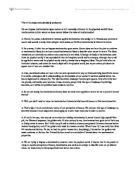A statement that is probably more fitting would be “mathematics is man’s attempt at reflecting and understanding nature”. However this is not entirely precise either, because there are many things mathematics can do which go beyond the scope of nature such as algebra, calculus, or even simple multiplication. All these things are methods by which mathematicians try to construct models, which are isomorphic (a map to plan out f:(g)->h, where 1:1), or show homomorphism (a map to plan out f:(g)->h) at the very least to the vast universe of nature. One of the most famous, and seemingly pointless examples is Buffon’s needle problem, posed in 1733. The problem consisted in finding the probability that a needle of length X dropped at random onto a piece of paper with equally spaced parallel lines X distance apart (same length as needle). The answer to the problem surprisingly turns out to be 2/π. Why π should come up is still a complete mystery and raises interesting questions about the ‘the unreasonable effectiveness of mathematics’.
Among other things, π has been around for c. 4000 years, and could be considered the isomorphic epitome of man’s goal when it comes to understanding nature. Apart from its mysterious appearance in Buffon’s needle problem, π is the most fundamental figure when doing any circle-related calculations – be it the area, circumference, radii, or chords. One can argue that the figure alone is proof that mathematics is at the heart of nature, however if we look closer at what π really is, as a number: irrational (cant be written in the format x/y), and is therefore endless – it becomes obvious that it is not part of nature, but simply trying to mirror it. The fact that it does so, so well shows that it is near isomorphic in its perfection.
Similarly the Fibonacci sequence has for almost 800 years fascinated mathematicians even more than π, for its ability to show up all over the natural world. The original sequence was discovered when trying to solve a problem Fibonacci was investigating about how fast rabbits could breed in ideal circumstances. The problem went like this
“Suppose a newly-born pair of rabbits, one male, one female, are put in a field. Rabbits are able to mate at the age of one month so that at the end of its second month a female can produce another pair of rabbits. Suppose that our rabbits never die and that the female always produces one new pair (one male, one female) every month from the second month on...”
The answer was 1,12,3,5,8,13,21,34…. What makes this sequence particularly interesting is the other places it fit in, which include; Fibonacci rectangles, spirals, The Golden Ratio – plant roots, plant petals, seed heads, and even pine cones to name a few, researchers and enthusiasts have found much more. And yet, we still have no clear idea why of all number sequences Fibonacci occurs so often. Arguably, in some cases the correlation may be completely coincidental, however popular belief argues that in living examples it follows a particular pattern within the DNA, because that particular pattern was the most effective. For example in plants, having 3 or 5 leaves mean a much greater exposure to light in comparison to having only 4 leaves, in a leaf : surface area ratio. The fact that it does not occur everywhere means that either the sequence is wrong, or that it is a homomorphism, and merely shows part of a much larger code we are unaware of.
I think that our mathematics at best, can be identical to a small part of nature – homomorphic to nature. Which basically means that all our mathematics can in one way or another be related to a natural element, on the other hand we will never know if the homomorphism we take for isomorphism is what it actually is, or if we were wrong all along and it is not. Additionally we will never know if we will be able to relate every natural recombination with a mathematical equation.
Theory Of Knowledge for the IB Diploma, pages 207-211







